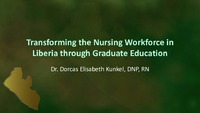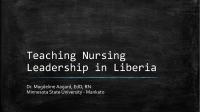Transforming the nursing workforce in Liberia through graduate education
View File(s)
Visitor Statistics
Visits vs Downloads
Visitors - World Map
Top Visiting Countries
| Country | Visits |
|---|
Top Visiting Cities
| City | Visits |
|---|
Visits (last 6 months)
Downloads (last 6 months)
Popular Works for Kunkel, Dorcas Elisabeth by View
| Title | Page Views |
|---|
Popular Works for Kunkel, Dorcas Elisabeth by Download
| Title | Downloads |
|---|
View Citations
Citations
Session presented on Monday, November 9, 2015:
Nursing education in Liberia, West Africa has been slowly recovering from the destruction of health care education institutions that was experienced during the horrific civil wars that took place from 1989-2003. There is a dearth of nurses prepared at the diploma or baccalaureate levels of education to meet practice needs and very few masters or doctoral prepared nurses to lead change to improve population health outcomes, public health and strengthen health systems (Flomo-Jones, 2013, Walsh, 2010). Health care financing is primarily provided by international humanitarian aid as Liberia is one of the poorest countries on the globe and thus there are limitations tied to donor interests (Flomo-Jones, 2013, Varpilah, 2011 ). Health care is delivered to the population as a package of basic health care, heavily weighted on preventive or health promotion services (Flomo-Jones, 2013). The weaknesses in health system infrastructure, public health and health care worker capacity in West Africa were made extremely evident by the Ebola epidemic of 2014 - 2015, particularly in the developing countries of Liberia, Sierra Leone and Guinea. In addition, the vulnerability of global health was also made evident by events such as regional and international travelers being able to transport Ebola rapidly through land and air travel causing much concern in developed countries in North America and Europe. Nurses are the greatest number of health care workers in Liberia, but even so their numbers and professional competencies must be increased in order to meet the health needs of the population and to rebuild or establish public health systems that assure rapid detection and an effective early response to any future outbreaks (Flomo-Jones, 2013, Varpilah, 2011). While the potential global impact of under-capacitated health care workforces in developing countries has risen to international concern in 2014 because of the reporting of the Ebola epidemic by the media, in fact we have been working to improve nursing work force capacity in Liberia since 2010 through an innovative curriculum delivery model. Currently there are only two graduate programs for nurses in Liberia. There is a Master of Nursing Management at Cuttington University (Flomo-Jones, 2013). In addition, a Master of Science in Nursing Education (MSN) program was developed in 2010 by expatriate nursing leaders who volunteered their time and expertise. This program is delivered atMother Patern College of Health Sciences (MPCHS), one of five colleges that make up Stella Maris Polytechnic, all under the Catholic Archdiocese of Monrovia. No doctoral programs for nursing are available in Liberia, and very few doctoral-prepared nurses, so volunteer expatriates fill the faculty gap in the graduate program. Modeled on the National League for Nursing's core competencies for nurse educators, the MSN curriculum at MPCHS is taught by expatriate faculty, some who have past connections to Liberia and others with interests in international nursing. Some instructors who are not nurses teach courses on statistics, writing and technology. All are committed to advancing global health by improving nursing education and by preparing Liberian nursing and midwifery personnel for evidence-based practice. The initial cohort had an enrollment of 17 students from eight Liberian schools of nursing, the Liberian Board of Nursing and Midwifery, and the Ministry of Health and Social Welfare. Six professors from the United States and one language instructor from England volunteered to teach in the first phase of the program over a period of 18 months. For the education practicum, students returned to their home institutions to put into practice the principles of teaching and learning. Sixteen students graduated in August 2012 and August 2013 and a third cohort of 15 students will graduate in August 2015. The program was developed and directed by Dr. Edna Johnson, PhD, RN, faculty emeritus, University of Connecticut to 2014. As of spring 2015, the MSN program is directed by Edwin Beyan, RN, BSc, MSN, graduate of the first cohort of students in the MSN program. The program is accredited by the Ministry of Education, Republic of Liberia and scholarships for students and related funding provided initially by FORECAST then handed over to WORLD LEARNING. These funding sources are both made possible through USAID (From the American People). Dorcas Kunkel, BSN, MS, DNP has been a volunteer nurse faculty in the MSN for nurse educators curriculum at MPCHS in Monrovia, Liberia teaching two courses for each cohort of students in 2011, 2012 and 2014.
43rd Biennial Convention 2015 Theme: Serve Locally, Transform Regionally, Lead Globally.
Items submitted to a conference/event were evaluated/peer-reviewed at the time of abstract submission to the event. No other peer-review was provided prior to submission to the Henderson Repository, unless otherwise noted.
| Type | Presentation |
| Acquisition | Proxy-submission |
| Review Type | Abstract Review Only: Reviewed by Event Host |
| Format | Text-based Document |
| Evidence Level | N/A |
| Research Approach | N/A |
| Keywords | Nursing Education; Leadership; Liberia |
| Name | 43rd Biennial Convention |
| Host | Sigma Theta Tau International, the Honor Society of Nursing |
| Location | Las Vegas, Nevada, USA |
| Date | 2015 |
All rights reserved by the author(s) and/or publisher(s) listed in this item record unless relinquished in whole or part by a rights notation or a Creative Commons License present in this item record.
All permission requests should be directed accordingly and not to the Sigma Repository.
All submitting authors or publishers have affirmed that when using material in their work where they do not own copyright, they have obtained permission of the copyright holder prior to submission and the rights holder has been acknowledged as necessary.
Related items
Showing items related by title, author, creator and subjects.
-
Nurse staffing and quality care in long-term care nursing facilities: Differences in rural and urban settings
Kunkel, Dorcas ElisabethPublic and congressional concern induced the Institute of Medicine (1996) to recommend increasing registered nurse (RN) staffing levels in nursing homes (NHs) to improve quality of care. The purpose of this study was to ... -
Graduate nursing education: Reforming perspectives through the lens of transformative learning
Morris, Arlene H.; Parker, Francine M. (2012-9-12)Purpose: Registered nurses often return to school for an advanced degree to fulfill an academic, personal or professional goal. Through the educational endeavor, these students may experience resocialization of their ... -
Teaching nursing leadership in Liberia
Aagard, Magdeline C. (2016-03-21)Session presented on Tuesday, November 10, 2015: Teaching nursing in a global context necessitates an understanding of the material being taught, as well as an understanding of the cultural context. Liberia's civil war ... -
Building a transformational nurse manager workforce through interactive competencies
Kulik, Carole Marie (2016-07-13)Session presented on Friday, July 22, 2016 and Thursday, July 21, 2016: Among nursing leadership roles, the nurse manager role has been identified as critical for the provision of high-performing, evidence-based, and ... -
How transformational leadership is addressing the rural nursing workforce
Williams, Amber Proctor (2016-03-17)Session presented on Friday, July 24, 2015: Greater supplies of nurses who are prepared at the BSN level minimally are needed to address increasingly complex healthcare and community needs in rural counties. Workforce ...





